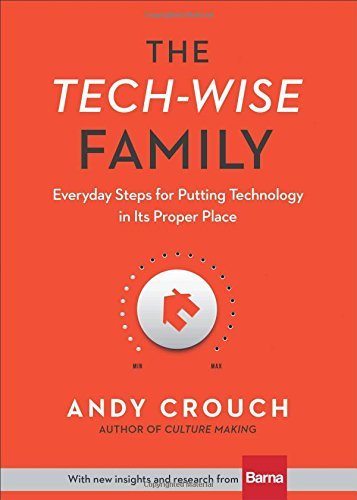Five Healthy Technology Habits
Society has undoubtedly been impacted and, in many ways, shaped by technological innovation. While technology is not inherently good or evil, it is important to recognize its propensity toward one or the other. So, if it isn’t clear that your technology use is a healthy means to a good end, then you should consider if it is having the opposite effect. The words of Paul in 1 Corinthians 6:12 are pertinent here: “All things are lawful unto me, but all things are not expedient: all things are lawful for me, but I will not be brought under the power of any.” Since technology is integrated into so many areas of our daily lives, it would be wise to periodically reflect on how it may be influencing us. May we can take comfort in knowing that amid a changing world, God’s Word remains a constant standard by which to live (Is. 40:8). So, as we care for our spiritual health, consider the following five healthy technology habits.
Regularly practice “unplugging.”
“Be still, and know that I am God:” Ps. 46:10a
From Christ withdrawing himself a “great while before day” (Mark 1:35) to Elijah hearing God through the “still small voice” (1 Ki. 19:12-13), God’s word is clear in its encouragement toward the need for solitude and stillness. In a world where there is constant activity, it can become increasingly difficult to practice this basic Christian discipline of quietness. It is healthy to examine your ability to get quiet before the Lord:
- What does it mean for you to “be still” before the Lord?
- When you take time to be quiet, how easy or difficult is it to settle your thoughts?
- Do you prioritize quiet time with God over checking your phone, email, or social media?
- How much of your day is spent looking at a screen?
Periodically consider the private vs public world.
“Discretion shall preserve thee, understanding shall keep thee:” Prov. 2:11
Smart phones and social media continue to increase our interactions. It has become easier to let others into both our public and private worlds. Sharing instant prayer requests or certain needs globally is a great example of using this increased interaction for good. Yet along with this communication ease, the question should be asked as to what is and is not appropriate to share. Simply because we can share every detail of our life, should we? What standards of discretion need to be put in place? As the above Proverb teaches, “discretion shall preserve” you and help determine the boundary of what is public and what should remain private. Ask yourself some basic questions before posting online:
- Can I edify and encourage through this?
- Is this a moment to protect and keep private?
- Is this necessary to post/share?
- Does this feed an insecurity of mine?
Consume online media with discernment.
“Prove all things; hold fast to that which is good. Abstain from all appearance of evil.” 1Thes. 5:21-22
The integration of technology into our daily life has become very seamless, yet this integration can bring a blurring of lines between reality and fantasy or truth and fiction. It can be easy to take everything we see online as truth, or subconsciously, we can give a higher level of credence to something posted online. These tendencies can prove unwise and can potentially loosen our standards of what is real or what is perceived. We begin to believe all we see in others’ lives online is how it “should” be instead of how it “might” be. It changes the expectations we hold for ourselves and others as we compare among ourselves (2 Cor. 10:12). Use the Word as your standard of truth and “prove all things” and ask yourself some of these basic questions you would ask of anything you see or hear:
- Does this post portray a real picture of who I am and what I believe?
- How am I discerning reality vs fantasy?
- Does this line up with the full counsel of biblical principles?
- Is this a fad or is this timeless in nature?
Spend more time building in-person relationships than online.
“So we, being many, are one body in Christ, and every one members one of another.” Rom. 12:5
Technology provides wonderful avenues of connection in our relationships. We can connect with those across the miles, rekindle relationships lost over the years, and have near instantaneous sharing with each other. However, we must also be aware of how technology is affecting our relationships in other ways. Technology can be used as a replacement for face-to-face contact, choosing to discuss critical issues in the perceived “safety” of technology. Likewise, an inaccurate image of each of us can often be portrayed, creating superficial relationships. In addition, the ability to quickly respond to each other hastily before the Spirit may temper our words can violate Ephesians 4:29 and allow for “corrupt communication” in our exchange. Finally, we can sometimes lose healthy inhibitions in the seeming freedom of social media and disturb healthy boundaries which should be in place. Self check questions are important as we examine our relationships with each other:
- Do I still have healthy face-to-face relationships? Who is my critical support network which I can turn to when needed?
- Am I using technology to avoid difficult issues or hide from crucial conversations I need to have?
- Do I find myself taking liberties with relationships online which I would not in face-to-face conversations?
- Am I being kind in what I am sharing/saying?
Set limits on screen time.
“For where your treasure is, there will your heart be also.” Mat. 6:21
How we spend our time and resources often reflects what is most dear to our heart. What is the most important thing in your life? It seems like an easy question with an obvious right answer, and yet, Christ’s teachings continually push us to examine ourselves in light of this question. Do my actions portray the proper alignment of what I value? Ask the Spirit to help you honestly answer the following questions:
- Is my screen time interfering with my time for God, family & friends?
- How does my screen time compare with my time communicating with God?
- Am I able to cut back on my technology use without discomfort?
What evidence exists to myself and others that Christ is most valuable in my eyes? Does evidence exist that technology is creeping into this space?
To view the PDF, click here.
For Further Information
 12 Ways Your Phone is Changing You
12 Ways Your Phone is Changing You ![]()
Author: Tony Reinke
This 211-page book identifies twelve potent ways our smartphones have changed us- for good and bad. It calls us to cultivate wise thinking and healthy habits in the digital age, encouraging us to maximize the many blessings while avoiding the various pitfalls.
 The Game is Playing Your Kid
The Game is Playing Your Kid ![]()
Author: Dr. Joe Dilley
This 218-page book encourages parents to monitor how our kids are using our various forms of technology. It discusses how you are decreasing your kids’ overreliance on technology without stifling their freedom or making them “outsiders” amongst their peers.
 The Tech-Wise Family: Everyday Steps for Putting Technology in Its Proper Place
The Tech-Wise Family: Everyday Steps for Putting Technology in Its Proper Place ![]()
Author: Andy Crouch
Making conscientious choices about technology in our families is more than just using internet filters and determining screen time limits for our children. It’s about developing wisdom, character, and courage in the way we use digital media rather than accepting technology’s promises of ease, instant gratification, and the world’s knowledge at our fingertips. And it’s definitely not just about the kids.
Additional resources regarding the usage of technology referenced in the Tech & Kids Podcast- Part 2.
Data Collection and Privacy Concerns
Privacy & Safety for Families
Social Media Risks & Tips






Comments
Leave a Comment